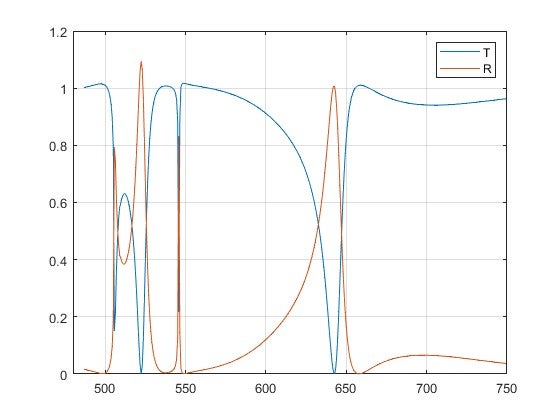-
-
February 21, 2023 at 7:35 am
sagar
SubscriberI am doing a simulation with periodic structures, like pillars (material 1) on top of a base (material 2), to get an idea about reflection and transmission with a plane wave source placed on top of the structures, at a certain distance. I need to check it with off-normal incident of the plane wave, so I included BFAST source. I am facing a problem with BFAST; as for the lower incident angle (up to 25 degrees), I am getting reflections of more than 1, basically the problem with the normalization. I have included extra mesh around the pillars, just to go towards the finer mesh, and also selected a mesh order of 4, but still, the problem remains. Please suggest how to resolve the problem. Another problem is for higher angles each simulation is taking more than 1h, even though I reduced the simulation time to 500fs instead of 1000fs.
-
February 21, 2023 at 7:23 pm
Guilin Sun
Ansys EmployeeDoes this structure have higher order diffraction? please check the diffraction angles. Most likely it is due to PML refelction. Plese
1: use coarser mesh such as mesh accuracy 2;
2: use steep angle PML, with 32 or 64 layers
If the simulation termonates around 100%, please increase the simulation time to be 100 times longer. If it terminates before 95%, you may also need to reduce the autoshutoff min at FDTD/Advanced options
Usually shortening the simulation time is not a good choice, since the DFT result needs the time signal decaying completely.
-
February 22, 2023 at 5:57 pm
sagar
SubscriberI did the simulation as you suggested, with a simulation time of 2000fs (where the source pulse width is order of 10fs), auto shut off min 1e-07 and PML layers of 64, steep angle, and mesh accuracy 2; I am still getting more than 1 reflection at 15 degrees with BFAST. I think there might be some others issues.
-
February 22, 2023 at 11:23 pm
Guilin Sun
Ansys EmployeeDid you check the log file at what percentage the simulation was terminated? if it is at 100% then you need to increase the simulation time.
Did you check the diffraction? what is the largest diffraciton angle? if it is over 60~70deg, you need to use Steep Angle PML.
Please test normal incidence first.
-
February 23, 2023 at 4:21 pm
sagar
SubscriberI checked that it is terminated at 100 % for 1000fs simulation time. So as you suggested, I increased it to 10ps with auto shutoff min 1e-07 and mesh accuracy 2, steep angle PML of layer number 64. And I did the simulation for the normal incident with broadband BFAST source (487 nm to 787 nm) with pulse width ~ 3fs and offset ~ 9fs, but still, I am getting the reflection of more than 1, even I tried with by adding extra mesh, but still there are no improvements.

Here is the simulation result Reflection and transmission. And for the BFAST source, the problem happens only at low incident angles; for higher angles (more than 35 degrees), the normalization is happening correctly.
I think there might be some other problem.
Can you tell me how to check the diffraction ?
-
February 23, 2023 at 5:14 pm
Guilin Sun
Ansys EmployeeYou can use grating analysis: https://optics.ansys.com/hc/en-us/articles/360042088813-Diffraction-grating
10ps might still not be long enough: it may also need to use smaller autoshutoff min. those are the two main causes:
PML reflection
simulaiton not long enough by simulation time and(or) autoshutoff min.
-
February 23, 2023 at 5:27 pm
sagar
SubscriberOkay, I will try with more simulation time and smaller auto-shutoff min. But this is only happening with a lower incident angle, not in the case higher incident angle, where for the higher incident angle simulation itself is taking longer time.
-
February 23, 2023 at 6:41 pm
Guilin Sun
Ansys EmployeeFor BFAST, larger incident angles requires smaller time steps, it is natural for long simulation time.BAST does not fit all simulations. Make sure you modify and check what I have suggested.
-
March 4, 2023 at 11:06 pm
sagar
SubscriberI did the simulation and it is working only with a large simulation time of 30ps. For each angle, it is taking almost one day. Is there any way to reduce the time? As I want to see the effect with the fine sweeping of off-normal incident angle, with a broadband source to produce a 2D map, looks like it will take more than months.
-
March 5, 2023 at 10:03 pm
sagar
SubscriberAnother problem I found like n my simulation I am working with cylindrical dielectric and trying to optimize the reflection with plane wave source by changing the radius, periodicity, and height. I observed that the simulation time is not the same for all the values of height, and just by making a small change in the height value the simulation time is changing a lot like from 5ps to 30 ps. This is creating problems in the optimization process. It is taking a lot of time when I AM DOING FINE SWEEP OF THE PARAMETERS.
-
March 6, 2023 at 10:52 pm
Guilin Sun
Ansys EmployeeIt is normal as when the parameter changes it is not the same device. The parameter changes can create or avoid large diffration angles and resonance.
I usually suggest users to do several different sweeps to narrow down the better parameter range. Sweep is different from optimization.
PS: please write a new post everytime you have different questions from the first post.
-
- The topic ‘Reflection is more than 1 with BFAST source for off-normal incident’ is closed to new replies.



-
5179
-
1838
-
1387
-
1249
-
1021

© 2026 Copyright ANSYS, Inc. All rights reserved.





